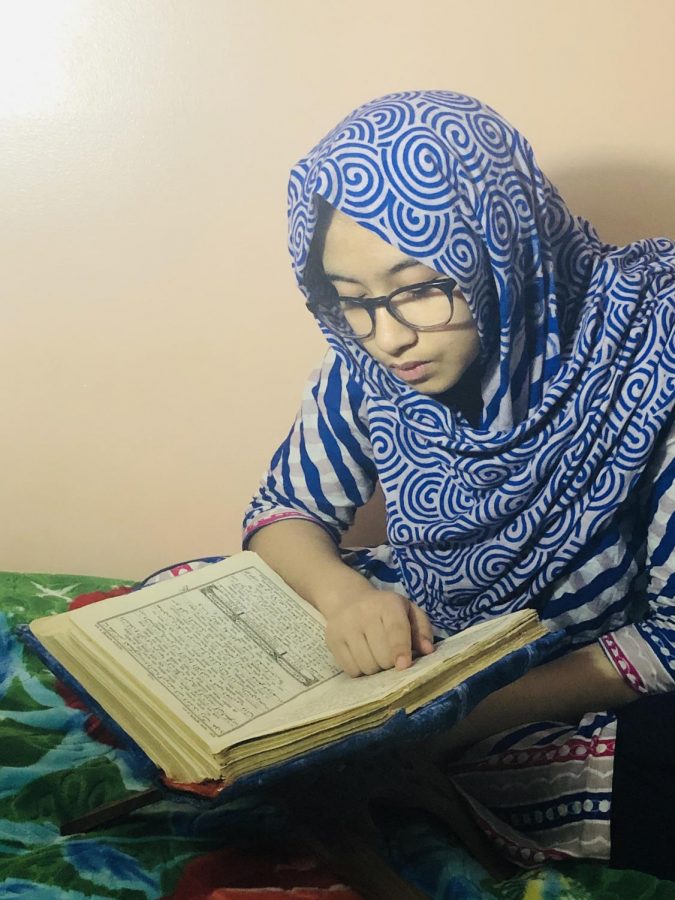The Experience of Ramadan During the COVID-19 Pandemic
During Ramadan, people try to spend time doing acts of worship, such as reading the Quran.
This year, Ramadan started at sunset on April 23, 2020. For Muslims around the world, Ramadan is a month filled with acts of worship, celebration, and community. In this holy month, Muslims are required to abstain from food and drink from sunrise to sunset, in order to physically detox their bodies and spiritually cleanse their souls. Throughout the course of the day and night, there are many different mandatory and optional prayers that are offered, as well as other forms of worship such as reading the Quran, practicing compassion, and doing dhikr, also known as the remembrance of Allah, in order to become closer to Allah.
In anticipation of the start of Ramadan, many students at Bronx Science prepared themselves both physically and spiritually. Because the main focus of Ramadan is to refine oneself, reconnecting spiritually is vital. Rukayat Chowdhury ’22 said, “I have been working on getting rid of a lot of my bad habits, such as avoiding lying, cursing, and music. I’ve also been focusing more on learning about my religion with spiritual videos and finding the meanings of certain prayers. I’m also making an emphasis on reading more Quran.” Many students also took steps to prepare for the fasts that are a part of Ramadan. “My family and I have been preparing for Ramadan with the food that we have at home and using it very carefully. We try to limit visits to the grocery store to decrease the risk of contracting the Coronavirus,” Ahona Rana ’22 said. With preparations completed, the Muslim community at Bronx Science was ready for a month of fasting and worship.
Students at Bronx Science partake in Ramadan every year with different traditions and customs. One aspect of Ramadan is the fast. “Some traditions in which my family and I partake are sitting on the floor and eating, as well as breaking our fast with a date. These are things that the prophet did, and so we make sure to do these things as well,” Ahad Rahman ’22 said. Besides fasting, worshipping is also a vital aspect of Ramadan. One student, Most Aktar ’21 said, “We do taraweeh prayer and we have suhoor (the meal eaten before the start of the fast) and iftar (the meal eaten to break the fast) together, as well as reading the Quran.” Starting the fast with suhoor, the early morning meal, breaking it with iftar, the evening meal, and worshipping by reading Quran and praying taraweeh are just some of the practices that people do during the holy month.
This year, the Coronavirus pandemic has left us all stuck in our homes, altering the Ramadan experience for many students. Normally, the social aspect is an important component of Ramadan, as people gather to enjoy iftar or pray together. “Usually, our family would go to the masjid to break our fast, but because of quarantine, we started to eat iftar at home,” Tasfia Shikder ’21 said. Likewise, “There is a huge prayer called taraweeh that Muslims attend at the mosque. However, I will have to pray that prayer at home with my family instead,” Toaha Muhammad ’22 said.
Nonetheless, there are positives to Ramadan taking place during quarantine. For example, there is more time to balance school and worship, and less fatigue during the fast. “I’d be reading the Quran more and praying slowly. I have to rush when I’m in school,” Aktar said. Even though Ramadan during quarantine is different, people are making the most of the situation by taking advantage of the extra time.
While the Coronavirus pandemic has affected our lives in so many different ways, people are still trying to participate in Ramadan to the best of their abilities. Even so, there are some people who are affected by Ramadan in quarantine more than others. Ahona Rana ’22 speaks to this in the following anecdote: “‘Baba ki masjid e?’ In English, this question means, ‘Is Dad at the masjid?’ This is the question that I used to ask my mom for the past five years during Ramadan. My dad owns a store in Jackson Heights, one of the most populated Muslim communities in New York City, and there is a masjid right around the corner of his store. I have never broken my fast with my father before this year, because he would always be at the masjid serving iftar to those who did not have food at home. Sitting down at the table to break my fast with my Dad in front of me is a constant reminder about how different things are right now. Although I’m happy to have iftar with my dad every night, I can’t help but think of those who rely on the masjid for food,” Rana said.
During this Ramadan, counting our blessings is more important than ever, as we have taken our lives for granted. Even though the quarantine has changed our normal Ramadan experience, it makes us realize that we have so much for which to be thankful, such as the guarantee of food, an amazing school, and socializing with our friends and family.
“I have never broken my fast with my father before this year because he would always be at the masjid serving iftar to those who did not have food at home. Sitting down at the table to break my fast with my Dad in front of me is a constant reminder about how different things are right now. Although I’m happy to have iftar with my dad every night, I can’t help but think of those who rely on the masjid for food,” said Ahona Rana ’22.
Areebah Qutub is a Staff Reporter for ‘The Science Survey’ and an Academics Section Reporter for ‘The Observatory.’ Areebah enjoys journalistic...

